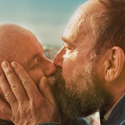
We’re sorry to make you wait so long, but we wanted to build a little suspense. As promised, here’s part two of our interview with queer artist, Robert W. Richards. In part one, Richards gave us a little background on his life growing up in Maine, moving away, finding his his first love and surviving his first tumultuous, yet symbiotic relationship.
In this conclusion, Richards chats about a veritable pot pourri of subjects, including living with Peggy Lee, working on Grand Theft Auto, hitchhiking for the sake of music and how he’s achieved his ultimate artistic goal.
Andrew Belonsky: The very first time we met, I thought, “Who is this man? He’s so happy! He’s incredible!” How do you stay that way?
Robert Richards: Because I’m lucky. I’m grateful that I’m able to do this. The only thing I ever really wanted was to be respected as an artist. I wanted to be good. Not wonderful or great or memorable, I just wanted to be good. And that’s still true. The past few years, people have made me start to think that I’ve accomplished “being good”. I saw that without any arrogance. Everybody else who started drawing when I started in New York are either retired or they’re teaching. And, you know, I’m working with Jonny McGovern and doing Grand Theft Auto…
AB: What did you do with Grand Theft Auto?
How about we take this to the next level?
Our newsletter is like a refreshing cocktail (or mocktail) of LGBTQ+ entertainment and pop culture, served up with a side of eye-candy.
RR: That wasn’t a happy experience for me. I was hired just to develop characters on paper, which I did and I loved. Then they asked me to work on the actual content. The money was like movie star money and seductive – even for a non-materialistic person such as myself. I realized, number one, that I didn’t understand their language at all. You’d have to enlist yourself in a Los Angeles gang for six months to understand what the fuck these people are talking about. And, you know, all my life I’ve been anti-violence, anti-death penalty: any violation of the human being. Grand Theft Auto is a reversal of the social order in which your friends are the thieves and you’re out to get the police. I just didn’t want to do it.
AB: How long did it take you before you could do what you wanted to be doing?
RR: It was a definite moment. An epiphany. I had been doing fashion and I had the absolute best of it. I was working for three American newspapers – Chicago, Los Angeles and The Christian Science Monitor – and I was traveling a great deal. It was strictly couture. I was just getting wearier and wearier of the cast of characters – these strange women evaluating these mega-expensive clothes. I was just tired of it and of the traveling. One night I was on a plane from Paris to Los Angeles and I thought to myself, “I’m not doing this anymore”. So I did my gig and I came back to New York and called everyone I worked for in that genre and I quit. What I hadn’t thought of was the future.
One day I thought, “Well I’d really like to draw men” and I called a few art directors and they said, “No, that’s not your thing”. [Finally] I thought of the gay magazines – I went to the newsstand and I bought all of them and I looked at the mastheads and I called [them]. By this time I had a few samples and I was welcomed with open arms. I started this whole gay journey that I’ve been on and it’s been the most gratifying thing I’ve ever done. I love every characteristic of a man. And now I’m happy with how I draw men. I think my drawings have emotion.
AB: That’s something about your work that I think other so-called “erotica” artists don’t really achieve is that emotion – even the ones that are blatant sex acts have that longing and lust and a real humanity behind them. There’s a lot of universality. Does it make you sad that your work gets put in the gay niche?
RR: No. I’m happy here. It’s the choice of what I want to do. I really feel that I’m contributing something to the community that I belong to and I find also now that what people want from me are very romantic images.
AB: Why do you think that is?

RR: I think because gay art has now reached a point where the people who buy it want to hang it in their homes. They don’t want to have to hide it when their mother comes over and I think the days of buying artwork and stashing it under your bed are all gone. We have generations of people who have grown up very aware of [sexuality]. I think those people come to a gallery and they’re not looking at the explicitness of an image anymore. They’re looking at the quality of the image. It’s just not enough to draw a picture of somebody sucking dick. There has to be involvement between the sucker and the suckee… I have an interesting and demented project that’s is totally developed and about a third done. It’s a book on the penis. It’s like an old medical book with a lot of totally obsolete and demented information – like the process of erection. It’s all done in a very antique, da Vinci style.
AB: Like a diagram?
RR: Yes, with arrows and stuff. It’s done with a pen that you dip in ink… It’s a pet of mine but it needs somebody daring to [publish] it. If you lived in 1907, this would be your owner’s manual.
AB: What’s it called?
RR: It doesn’t have a name. It’s just My Penis Book. I’ll probably call it, The Penis Owner’s Manual.
AB: That’s a fine title.
RR: It’s also a book that could sort of cross over – penises appeal to the whole world.

AB: You don’t seem like a very nostalgic person.
RR: I can let go.
AB: Are you on guard right now?
RR: With you? No. Are you asking that because I said I was performing?
AB: No, because you said you can let go.
RR: Oh, we were referring to two different things. What I meant is that when I’ve done something, I’m done with it – I don’t go back on it. I don’t live in the past, which I think is probably the secret to keeping going. It’s over. [Of course] I have a very strong group of friends who have been in my life for a long. I still play music from my past, so maybe that’s my nostalgia Achilles’ heel. I like the great female singers – Billie Holiday, Sarah Vaughn, Peggy Lee. And I knew them all. I’ve had relationships with all of these women…When I was young, I grew up in the French ghetto in Maine –
AB: I was curious about that – you went to French school.
RR: Yes, I went to Catholic school that was taught in French and Church was in French and we listened to Canadian radio. Television existed, but we didn’t have it. I used to stand outside people’s house who had TV and look in the window and see this magical thing in their living room. Anyway, I had to develop my own world and I would save up and buy magazines and go to the movies once a week. It was all a big dreamscape. Reality wasn’t easy.
There was only one English speaking family in the whole neighborhood and they kept to themselves and they had a daughter who was a little older than I. I used to see her go by with her mother and I knew that they went to the movies every time the movie changed, which was three times a week and I envied that, of course. One day she came by and invited me to her house. When I got there, she had a brother who was a musician and he was sitting in the living room in his pajamas in the afternoon. He was playing music and he put on Sarah Vaughn singing “Black Coffee”. The second she started to sing, I thought, “You can do what you want. People didn’t tell her how to do this. She just figured this out.” That opened up my entire life – that moment.
From then on, I would sneak away and go to the highway with my wagon and pick up bottles and sell the bottles and this became my whole life. Saturdays I used to run to the highway with my movie money and my savings, so I had like a dollar, and I used to hitchhike to Portland, which was like 40 miles away… And I’d buy my record and I had to get back home when the movie ended – but it was double feature with serials in between, so it started at 1 and you got out at 5. But it was wonderful; I never had a bad incident.
AB: You never got caught?
RR: No! And nobody ever did anything to me while hitchhiking. It’s kind of sad. As Kiki would say, “I must have been a really ugly kid if nobody tried to abuse me.” Anyway, when I got to Boston, I was able to pursue this music thing. Then I moved to New York and one day I saw that Sarah Vaughn was coming to the Rainbow Room and I was very excited and I saved my money and I went. And on the day of it I thought, “Oh, I’m going to send her flowers”. So I sent her roses. The florist gave me a card and I said, “Oh, she won’t know who it is, so I’m not going to put a card”. So, they just delivered the flowers to the Rainbow Room dressing room. There was bar outside the Rainbow Room and I was with my friend from high school and we sat at the bar to discuss this event we had just witnessed and Sarah came into the bar alone. She walked right over to me and said, “Did you send me flowers?” And I said “yes”. And she said, “Why didn’t you sign the card?” And I said, “Well, you wouldn’t know who I was”.
AB: How did she know who you were?
RR: She said she had seen me before, because I had seen her in Boston at clubs. She said, “You look so unalike the people who usually come to see me, that I remembered you”. We chatted for about twenty minutes or so and she said, “Tomorrow night there’s a big press party – I really don’t have anybody, so would you like to come?” So I went and from that day on we were friends until the day she died, which was 27 years.
AB: That’s incredible.

RR: This has always happened to me. Anything I’ve ever been attracted to has come to me. I don’t know why that is… It just went on that way. When I was still in Boston – through a ridiculous racial incident, I met Dinah Washington and wound up leaving Boston with her. It’s just insane.
AB: Have you considered writing an autobiography?
RR: I have, but it’s just so personal. I’ve been approached about it a couple of times, because I’ve had a really topsy-turvy life. I lived with Peggy Lee for six months and that was totally horrifying.
I had a Japanese fashion client and they used to come to New York every now and then. One day I took them [out] and Peggy Lee was coming to the Waldorf and I took them. I knew Peggy for years, so I took them upstairs to visit after the show. The Japanese guy was totally taken with her and it was the year of the Bicentennial and they invited her to Japan. All the celebrities were doing home lines – like Gloria Vanderbilt bathroom accessories – and Peggy did little drawings and I put some of them [together] and we did a little presentation and the Japanese bought it, so I went to Los Angeles with her, but it all turned into madness. I had no intention of staying in her house, but it turned out that her entire staff quit and she needed somebody there and that somebody became me and for a few months I was kind of her maid. Horrifying. It was just a ridiculous thing. The human condition enters into it and I’m not at all unsympathetic, but I didn’t want it to be part of my life. She was a brilliant artist and that never diminished in my eyes, but oh Lordy, what downers can do to you!


















FAST CASH ADVANCE PAYDAY LOAN
THE MONEY MARKET would alter the public’s demand for money because their features differed from those of existing forms of money
LOAN PAYDAY
) qualify for a home loan, the sales comparison data approach may be considered the property
CASH LOAN PAYDAY
Where to Find Hard-Money Lenders Hard-money lenders are fairly easy to find, once you know where to look
FAST CASH ADVANCE PAYDAY LOAN
Part of Free cash flow calculation
CHEAP PERSONAL LOAN
beetles
ADVANCE CASH
A WARNING: Don’t listen to poor or frightened people
CASH TIL PAYDAY
Either way, the wrap concept means you are collecting one payment and paying an underlying loan
APPLY FOR PERSONAL LOAN
” “How do I make money
CHEAP PERSONAL LOAN
home
CASH LOAN PAYDAY
expands total bank reserves, leading to a multiple expansion of loans and investments